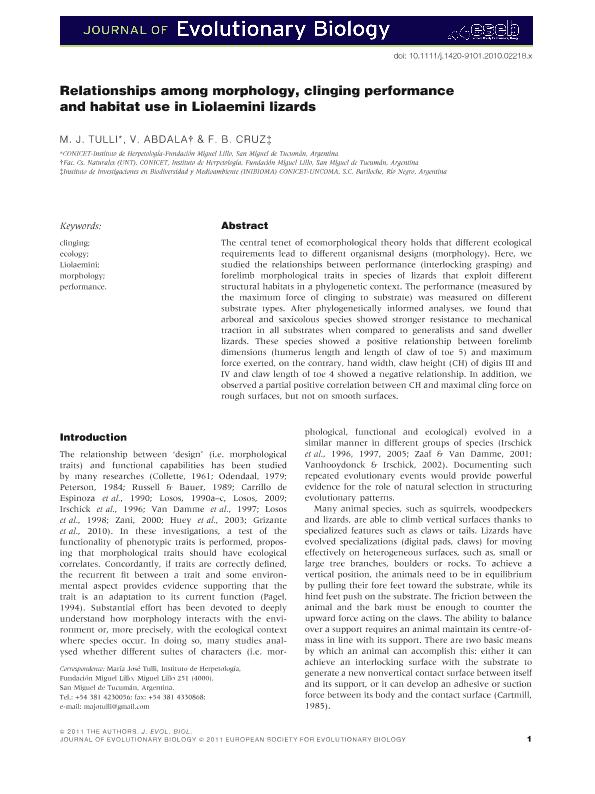Mostrar el registro sencillo del ítem
dc.contributor.author
Tulli, María José

dc.contributor.author
Abdala, Virginia Sara Luz

dc.contributor.author
Cruz, Felix Benjamin

dc.date.available
2019-06-03T14:55:13Z
dc.date.issued
2011-01
dc.identifier.citation
Tulli, María José; Abdala, Virginia Sara Luz; Cruz, Felix Benjamin; Relationships among morphology, clinging performance and habitat use in Liolaemini lizards; European Society for Evolutionary Biology; Journal of Evolutionary Biology; 24; 4; 1-2011; 843-855
dc.identifier.issn
1420-9101
dc.identifier.uri
http://hdl.handle.net/11336/77531
dc.description.abstract
The central tenet of ecomorphological theory holds that different ecological requirements lead to different organismal designs (morphology). Here, we studied the relationships between performance (interlocking grasping) and forelimb morphological traits in species of lizards that exploit different structural habitats in a phylogenetic context. The performance (measured by the maximum force of clinging to substrate) was measured on different substrate types. After phylogenetically informed analyses, we found that arboreal and saxicolous species showed stronger resistance to mechanical traction in all substrates when compared to generalists and sand dweller lizards. These species showed a positive relationship between forelimb dimensions (humerus length and length of claw of toe 5) and maximum force exerted, on the contrary, hand width, claw height (CH) of digits III and IV and claw length of toe 4 showed a negative relationship. In addition, we observed a partial positive correlation between CH and maximal cling force on rough surfaces, but not on smooth surfaces.
dc.format
application/pdf
dc.language.iso
eng
dc.publisher
European Society for Evolutionary Biology
dc.rights
info:eu-repo/semantics/openAccess
dc.rights.uri
https://creativecommons.org/licenses/by-nc-sa/2.5/ar/
dc.subject
Clinging
dc.subject
Ecology
dc.subject
Liolaemini
dc.subject
Morphology- Performance.
dc.subject.classification
Otras Ciencias Biológicas

dc.subject.classification
Ciencias Biológicas

dc.subject.classification
CIENCIAS NATURALES Y EXACTAS

dc.title
Relationships among morphology, clinging performance and habitat use in Liolaemini lizards
dc.type
info:eu-repo/semantics/article
dc.type
info:ar-repo/semantics/artículo
dc.type
info:eu-repo/semantics/publishedVersion
dc.date.updated
2019-05-31T14:13:04Z
dc.journal.volume
24
dc.journal.number
4
dc.journal.pagination
843-855
dc.journal.pais
Alemania

dc.journal.ciudad
Nueremberg
dc.description.fil
Fil: Tulli, María José. Fundación Miguel Lillo. Dirección de Zoología. Instituto de Herpetología; Argentina. Consejo Nacional de Investigaciones Científicas y Técnicas. Centro Científico Tecnológico - Tucumán. Unidad Ejecutora Lillo; Argentina
dc.description.fil
Fil: Abdala, Virginia Sara Luz. Fundación Miguel Lillo. Dirección de Zoología. Instituto de Herpetología; Argentina. Consejo Nacional de Investigaciones Científicas y Técnicas. Centro Científico Tecnológico Conicet - Tucumán. Instituto de Biodiversidad Neotropical. Universidad Nacional de Tucumán. Facultad de Ciencias Naturales e Instituto Miguel Lillo. Instituto de Biodiversidad Neotropical. Instituto de Biodiversidad Neotropical; Argentina
dc.description.fil
Fil: Cruz, Felix Benjamin. Consejo Nacional de Investigaciones Científicas y Técnicas. Centro Científico Tecnológico Conicet - Patagonia Norte. Instituto de Investigaciones en Biodiversidad y Medioambiente. Universidad Nacional del Comahue. Centro Regional Universidad Bariloche. Instituto de Investigaciones en Biodiversidad y Medioambiente; Argentina
dc.journal.title
Journal of Evolutionary Biology
dc.relation.alternativeid
info:eu-repo/semantics/altIdentifier/url/https://onlinelibrary.wiley.com/doi/full/10.1111/j.1420-9101.2010.02218.x
dc.relation.alternativeid
info:eu-repo/semantics/altIdentifier/doi/https://dx.doi.org/10.1111/j.1420-9101.2010.02218.x
Archivos asociados
